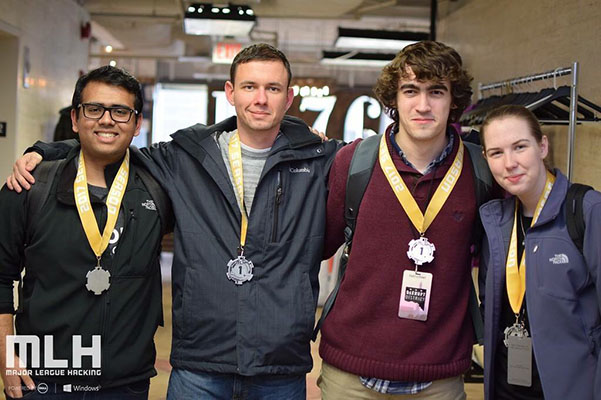Pictured above: VCU computer science majors Mit Amin, Paul Hudgins, Jonathon Headley and Courtney Parry won First Place at Disrupt the District, a Washington, D.C.-based hackathon that focuses on tech development for social good. Photos by Jason Hall, courtesy of Major League Hacking powered by Dell and Windows
UPDATE: Jonathan Headley, Paul Hudgins, Courtney Parry and Austin Sarmento won First Place at TribeHacks on April 2 at the College of William and Mary. Their winning app, called RubberNeck, makes fixed-camera drones more flexible and easier to control.
Richmond, VA (March 29, 2017) - Apps that feature innovative ways to use speech-recognition technology recently placed VCU School of Engineering computer science students in the winners circles at hackathons in Washington, D.C. and Baltimore, Maryland.
CS majors Mit Amin, Jonathon Headley, Paul Hudgins, Courtney Parry and Austin Sarmento were on teams that took prizes at the HopHacks and Disrupt the District hackathons in February.
Amin, Headley, Hudgins and Parry won First Place at Disrupt the District, a hackathon focused on diversity, inclusion and tech development for social good held Feb. 11-12 in Washington, D.C. Their winning app, PocketLawyer, uses speech-recognition to provide real-time guidance during interactions with law enforcement officers. When activated, it listens to the conversation between user and officer and reminds users of their rights, encourages respectful conduct throughout the interaction and provides a record of the encounter. During a routine traffic stop, for example, PocketLawyer will suggest not arguing with the officer and reminds the user that he or she can argue in court. It also furnishes a record of the encounter that the user’s attorney can use. If the app detects that a voluntary search is requested, it reminds the user that he or she does not have to consent to be searched. Headley and Hudgins developed the logic that generates the advice, while Parry and Amin designed the user experience side of PocketLawyer.
Sarmento joined Amin, Headley and Hudgins for HopHacks held Feb. 18-19 at Johns Hopkins University in Baltimore, Maryland, where the team won the prize for Best Use of Capital One’s Nessie application programming interface (API). An API is a set of protocols and tools for building application software. The team’s Android app, called ReachOut, makes microlending easier for users throughout the world. The app provides an accessible way to create proposals and receive funds. Its user interface does not require literacy; instead, users receive a series of audio prompts about their loan request and how they will use it. ReachOut records each response using Google’s speech-to-text API. Users can also attach pictures to proposals. Accounts and transfers are managed with Capital One’s Nessie API. It tracks repaid loans and calculates a credit score, so ReachOut is designed to allow an entire community to share a single device and build credit together. “It’s targeted at communities that are too remote to be reached by existing microlending tools and doesn't require as much of a local footprint from humanitarian organizations as existing systems,” Hudgins said.
The students team up again for TribeHacks at the College of William and Mary on March 31, and for BitCamp at the University of Maryland, College Park on April 7.
